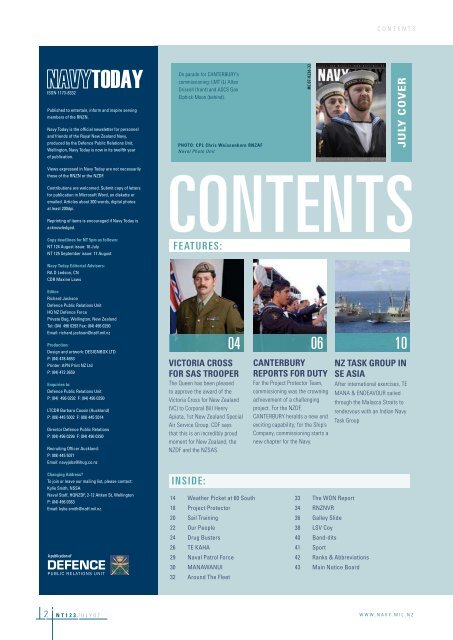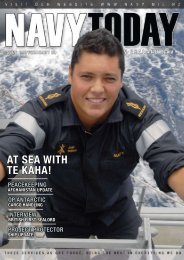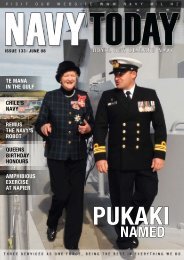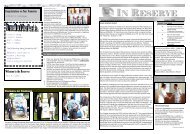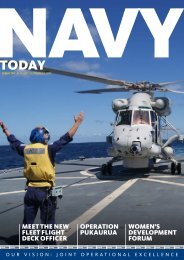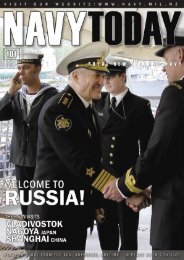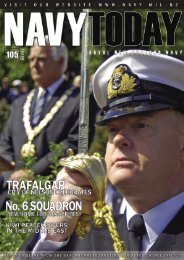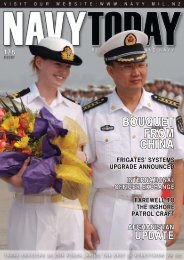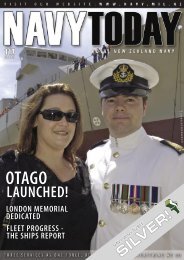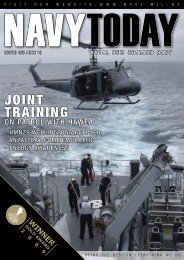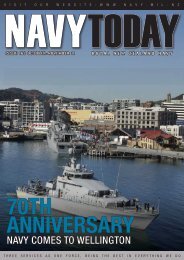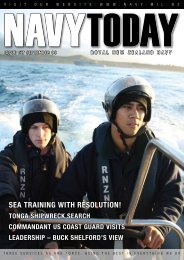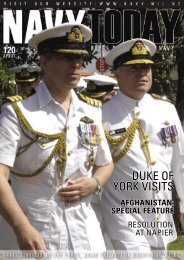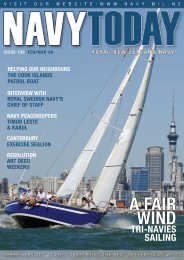CANTERBURY! HMNZS - Royal New Zealand Navy
CANTERBURY! HMNZS - Royal New Zealand Navy
CANTERBURY! HMNZS - Royal New Zealand Navy
- No tags were found...
You also want an ePaper? Increase the reach of your titles
YUMPU automatically turns print PDFs into web optimized ePapers that Google loves.
ISSN 1173-8332Published to entertain, inform and inspire servingmembers of the RNZN.<strong>Navy</strong> Today is the official newsletter for personneland friends of the <strong>Royal</strong> <strong>New</strong> <strong>Zealand</strong> <strong>Navy</strong>,produced by the Defence Public Relations Unit,Wellington, <strong>Navy</strong> Today is now in its twelfth yearof publication.Views expressed in <strong>Navy</strong> Today are not necessarilythose of the RNZN or the NZDF.Contributions are welcomed. Submit copy of lettersfor publication in Microsoft Word, on diskette oremailed. Articles about 300 words, digital photosat least 200dpi.Reprinting of items is encouraged if <strong>Navy</strong> Today isacknowledged.Copy deadlines for NT 5pm as follows:NT 124 August issue: 16 JulyNT 125 September issue: 17 August<strong>Navy</strong> Today Editorial Advisers:RA D Ledson, CNCDR Maxine LawsEditor:Richard JacksonDefence Public Relations UnitHQ NZ Defence ForcePrivate Bag, Wellington, <strong>New</strong> <strong>Zealand</strong>Tel: (04) 496 0293 Fax: (04) 496 0290Email: richard.jackson@nzdf.mil.nzProduction:Design and artwork: DESIGNBOX LTDP: (04) 478 4653Printer: APN Print NZ LtdP: (04) 472 3659Enquiries to:Defence Public Relations UnitP: (04) 496 0292 F: (04) 496 0290LTCDR Barbara Cassin (Auckland)P: (09) 445 5002 F: (09) 445 5014Director Defence Public RelationsP: (04) 496 0299 F: (04) 496 0290Recruiting Officer Auckland:P: (09) 445 5071Email: navyjobs@ihug.co.nzTODAYChanging Address?To join or leave our mailing list, please contact:Kylie Smith, NSSANaval Staff, HQNZDF, 2-12 Aitken St, WellingtonP: (04) 496 0363Email: kylie.smith@nzdf.mil.nz.A publication ofDEFENCEPUBLIC RELATIONS UNITOn parade for <strong>CANTERBURY</strong>’scommissioning: LMT (L) AllanDriscoll (front) and ASCS GanElphick-Moon (behind)..PHOTO: CPL Chris Weissenborn RNZAFNaval Photo Unit14 Weather Picket at 60 South18 Project Protector20 Sail Training22 Our People24 Drug Busters26 TE KAHA29 Naval Patrol Force30 MANAWANUI32 Around The Fleet0433 The WON Report34 RNZNVR36 Galley Slide38 LSV Coy40 Band-dits41 Sport42 Ranks & Abbreviations43 Main Notice BoardJULY COVERCONTENTSFEATURES:VICTORIA CROSSFOR SAS TROOPERThe Queen has been pleasedto approve the award of theVictoria Cross for <strong>New</strong> <strong>Zealand</strong>(VC) to Corporal Bill HenryApiata, 1st <strong>New</strong> <strong>Zealand</strong> SpecialAir Service Group. CDF saysthat this is an incredibly proudmoment for <strong>New</strong> <strong>Zealand</strong>, theNZDF and the NZSAS.INSIDE:MC 07-0226-32<strong>CANTERBURY</strong>REPORTS FOR DUTYFor the Project Protector Team,commissioning was the crowningachievement of a challengingproject. For the NZDF,<strong>CANTERBURY</strong> heralds a new andexciting capability; for the Ship’sCompany, commissioning starts anew chapter for the <strong>Navy</strong>.CONTENTS06 10NZ TASK GROUP INSE ASIAAfter international exercises, TEMANA & ENDEAVOUR sailedthrough the Malacca Straits torendezvous with an Indian <strong>Navy</strong>Task GroupYOURS AYETHIS month I’d like to write about a word– specifically to communicate about ‘communicate’.A dictionary definition of ‘communicate’– to share or exchange informationor ideas – demonstrates how key it isto everything we do. We can communicatewith each other in a number ways, by gestures,in writing, but I’d like to focus oncommunicating by speech.I, and other senior personnel, get out andabout around the <strong>Navy</strong> talking to everyonewe can. We visit Sailors in their ships, inNZ and overseas, and we visit Sailors andour civilian staff ashore. We award medalsand commendations, present prizes, attendgraduation parades and ceremonies,visit leadership and other professional courses, we have mealswith <strong>Navy</strong> people – and we get involved in a range of otheractivities.We use each of these occasions to communicate. Generallythe communication will be about how the contributions madeby people are valued – and how important to the <strong>Navy</strong> it is thatwe have people who will step up and make a contribution.We also talk about our Vision and about what ‘the best small-nation<strong>Navy</strong> in the world’ will look like – in terms of its operational,organisational and people aspects.Often we will make mention of our Core Values and their importanceand how they define to a very large extent who’s rightfor the <strong>Navy</strong> and those for whom the <strong>Navy</strong> is not a good fit.Sometimes, the communication will be about the challengesfacing the <strong>Navy</strong> – and about the plans we have for the future.On occasions, the communication will be about how well weare doing; sometimes, though, it will be about what we are notdoing so well, and about the need to lift our game.Often, the opportunity is used to find out what things are importantto people by giving them the chance to ask questions– or by listening to presentations. After all, communication issupposed to be an interactive activity – and passive activitiescan get boring.So communication is critical if people are to understand wherewe are heading, why we should all want to aim for that futurepoint, how we are going to reach it, the part each of us will play.And communication lets us apply port or starboard helm whenwe occasionally drift to left or right of track, or a hazard is identifiedout in front of us. To work in this way, though, communicationmust be effective – and this is not easy to achieve.I know from hard won experience. After I have talked to peoplethe WON generally gets feedback very quickly – and it seemsto be honest. I say that with a degree of confidence becausethe comments range from ‘It was OK’to ‘He missed the mark completely’ to‘What was he on about?’In view of those comments I havespent some time in the past thinkingabout the things I need to do to lift mygame - what I need to do to be a moreeffective ‘communicator’. I asked myselfquestions such as ‘Is the messagetoo complex?’ – ‘Is it boring?’ – ‘Is rankgetting in the way?’ – ‘Should I makemore use of stories?’ – and so on. I’msure part of each answer, to varyingdegrees, is ‘Yes’.However, I’ve also started thinkingin broader terms – in terms that setcommunication in a contractual context. This is the way I seeit now:The speaker has an obligation to speak in a way that engagesthe listener, and in a way that is sensitive to the purpose ofthe communication as well as to the particular character of thelistener.Importantly, though, the listener also has obligations. Theseare not necessarily easy to deliver on – and if speaking effectivelyis a skill, and one that needs to be worked on, so too islistening effectively.The listener has to listen – and that requires some degree ofconcentration. They need to be ‘in the same mind-space’ asthe speaker. There is nothing more off-putting that speakingto someone whose body language and lack of attentivenessindicates they would much rather be in a different space to theone they are currently occupying. (Sometimes, it seems to methat listeners in this mode are having out-of-body experiencesas they roll and twitch in their seats!)This characteristic is seen most often when people are verybusy. I have found that when the pressure goes on people, someof them seem never to be in the conversation that they are having– they are always thinking of the next one. This is a recipe fororganisational dysfunctionality if it’s allowed to persist.Listeners need to work to understand accurately and conceptuallywhat the speaker is saying – and they should ask questionsif they don’t. It amazes me how often people seem to beunable to do this.Effective communication can get us to the top of mountains– but a failure to communicate effectively will have us doingnothing more than milling aimlessly about at the base camp.So, if we are going to get communication to work really well inthe <strong>Navy</strong> then we all have to do what we can to make sure thatwe are effective speakers, and - effective listeners.RADM DAVID LEDSONCHIEF OF NAVYYOURS AYE2 NT123JULY07 WWW.NAVY.MIL.NZWWW.NAVY.MIL.NZNT123JULY07 3


